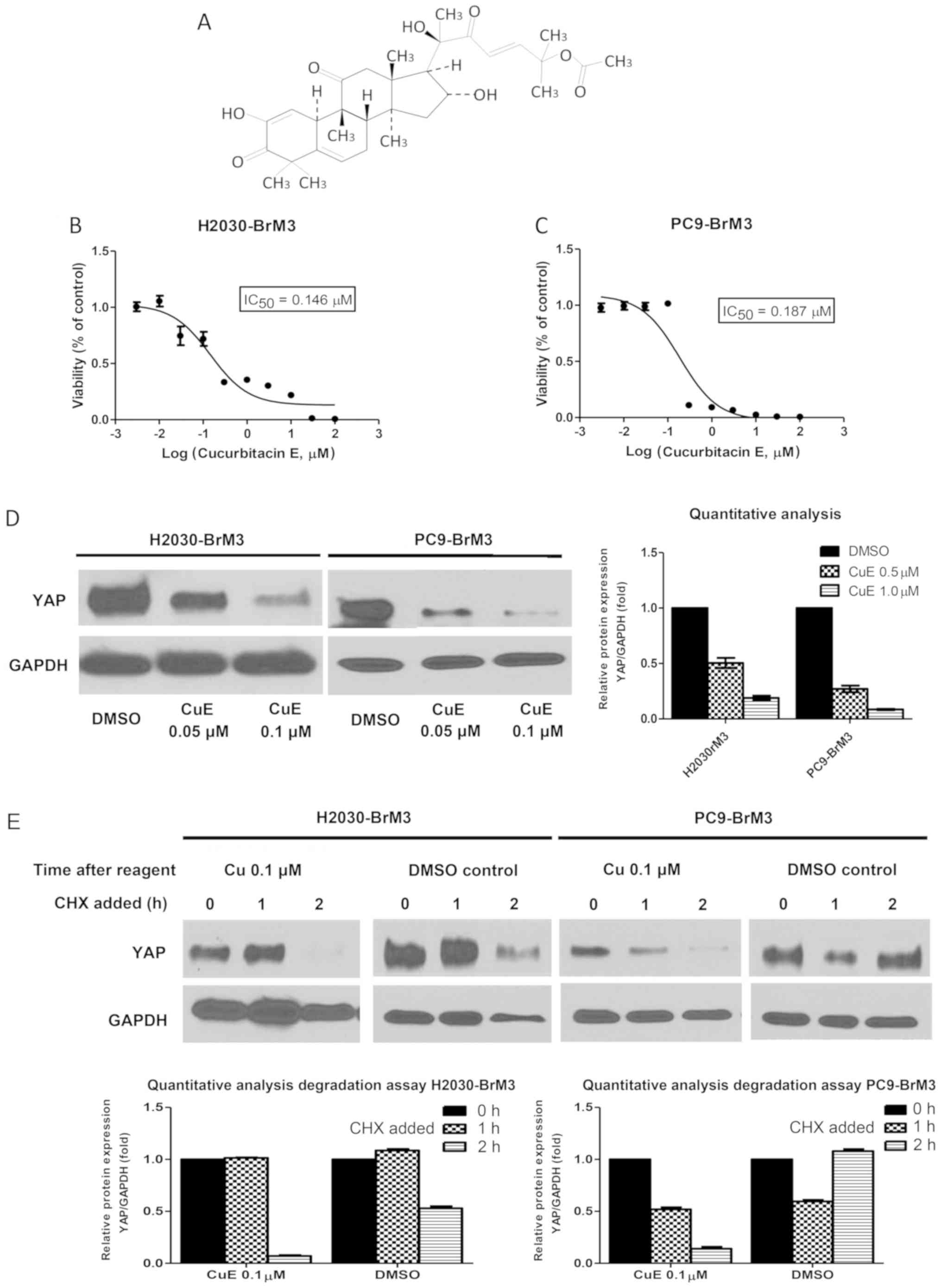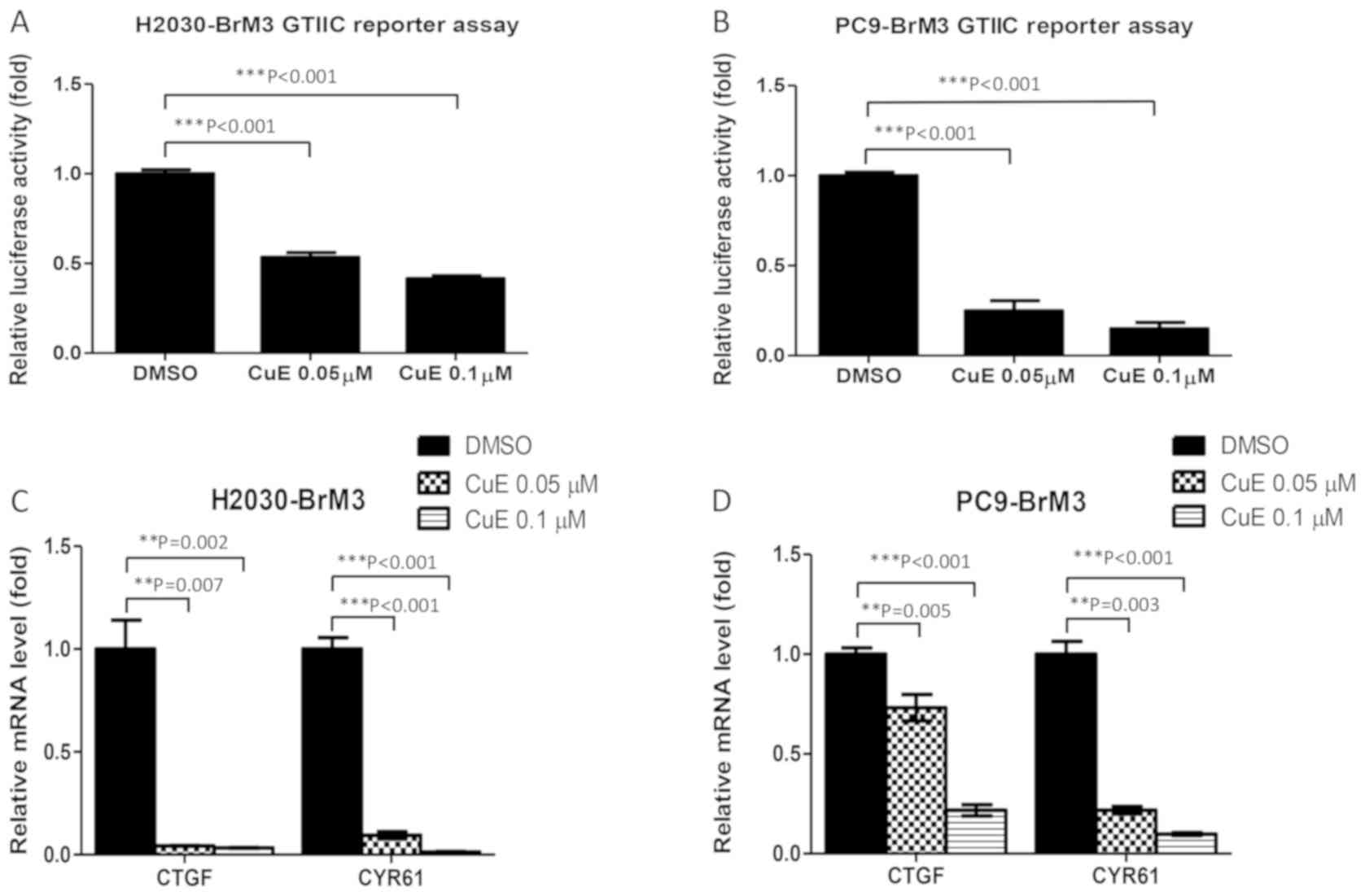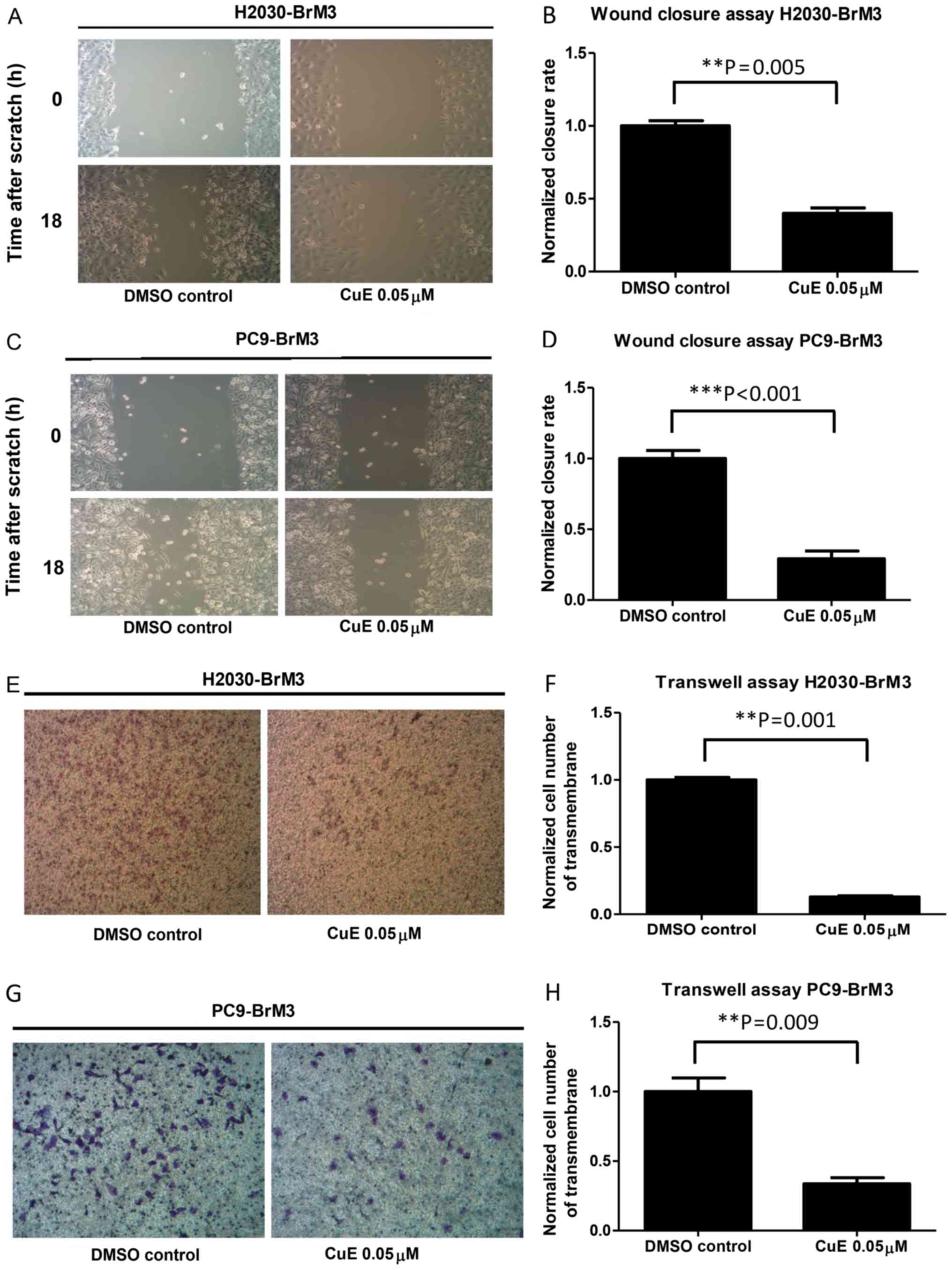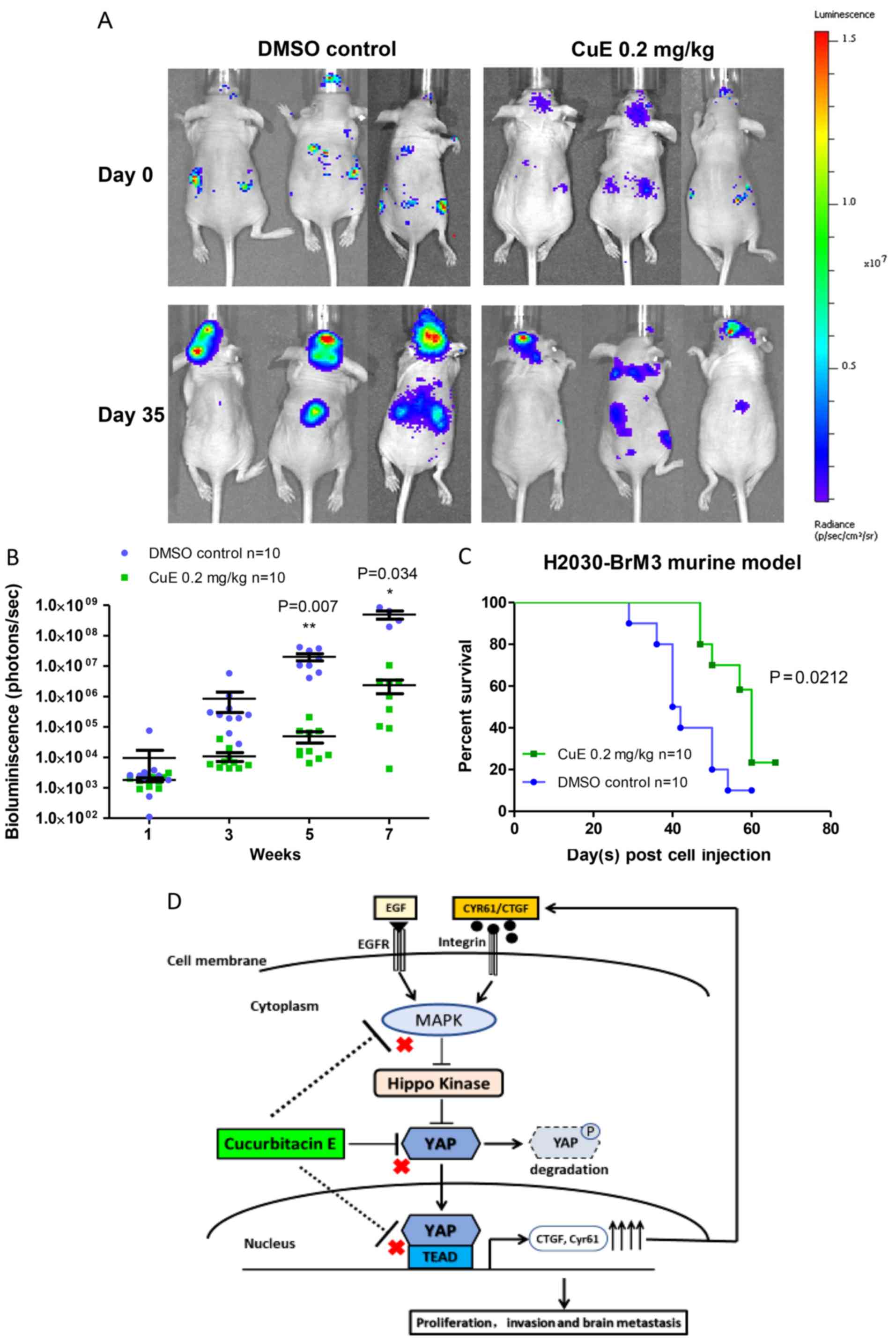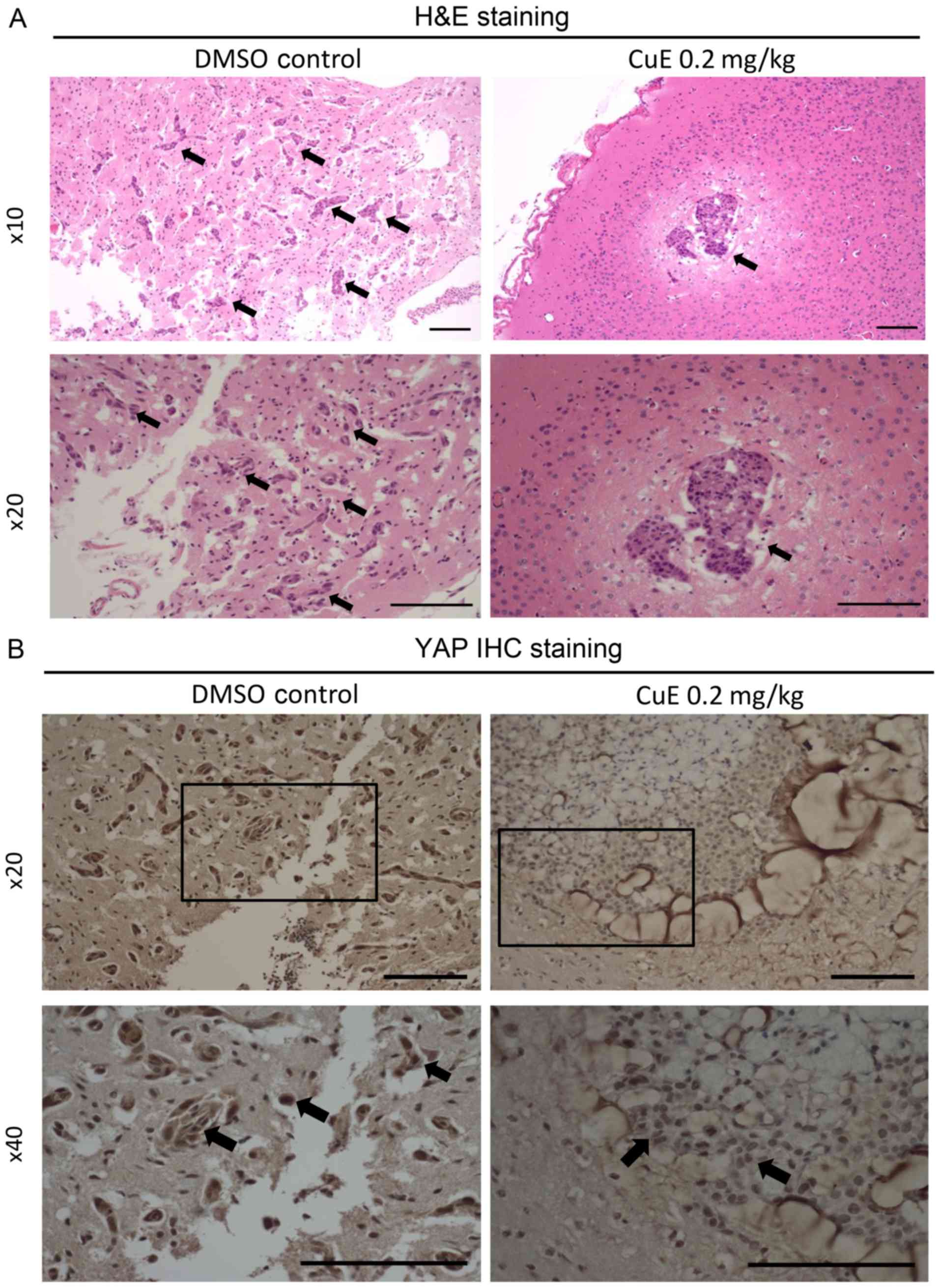|
1
|
Duell T, Kappler S, Knöferl B, Schuster T,
Hochhaus J, Morresi-Hauf A, Huber RM, Tufman A and Zietemann V:
Prevalence and risk factors of brain metastases in patients with
newly diagnosed advanced non-small-cell lung cancer. Cancer Treat
Commun. 4:106–112. 2015. View Article : Google Scholar
|
|
2
|
Ma X, Zhu H, Guo H, Han A, Wang H, Jing W,
Zhang Y, Kong L and Yu J: Risk factors of brain metastasis during
the course of EGFR-TKIs therapy for patients with EGFR-mutated
advanced lung adenocarcinoma. Oncotarget. 7:81906–81917. 2016.
View Article : Google Scholar : PubMed/NCBI
|
|
3
|
Sørensen JB, Hansen HH, Hansen M and
Dombernowsky P: Brain metastases in adenocarcinoma of the lung:
Frequency, risk groups, and prognosis. J Clin Oncol. 6:1474–1480.
1988. View Article : Google Scholar : PubMed/NCBI
|
|
4
|
Dempke WC, Edvardsen K, Lu S, Reinmuth N,
Reck M and Inoue A: Brain metastases in NSCLC-are TKIs changing the
treatment strategy? Anticancer Res. 35:5797–5806. 2015.PubMed/NCBI
|
|
5
|
Deng Y, Feng W, Wu J, Chen Z, Tang Y,
Zhang H, Liang J, Xian H and Zhang S: The concentration of
erlotinib in the cerebrospinal fluid of patients with brain
metastasis from non-small-cell lung cancer. Mol Clin Oncol.
2:116–120. 2014. View Article : Google Scholar : PubMed/NCBI
|
|
6
|
Paz-Ares L, Soulières D, Moecks J, Bara I,
Mok T and Klughammer B: Pooled analysis of clinical outcome for
EGFR TKI-treated patients with EGFR mutation-positive NSCLC. J Cell
Mol Med. 18:1519–1539. 2014. View Article : Google Scholar : PubMed/NCBI
|
|
7
|
Taniguchi Y, Tamiya A, Nakahama K, Naoki
Y, Kanazu M, Omachi N, Okishio K, Kasai T and Atagi S: Impact of
metastatic status on the prognosis of EGFR mutation-positive
non-small cell lung cancer patients treated with first-generation
EGFR-tyrosine kinase inhibitors. Oncol Lett. 14:7589–7596.
2017.PubMed/NCBI
|
|
8
|
Li K, Yang M, Liang N and Li S:
Determining EGFR-TKI sensitivity of G719X and other uncommon EGFR
mutations in non-small cell lung cancer: Perplexity and solution
(Review). Oncol Rep. 37:1347–1358. 2017. View Article : Google Scholar : PubMed/NCBI
|
|
9
|
Cao Z, Gao Q, Fu M, Ni N, Pei Y and Ou WB:
Anaplastic lymphoma kinase fusions: Roles in cancer and therapeutic
perspectives. Oncol Lett. 17:2020–2030. 2019.PubMed/NCBI
|
|
10
|
Khan M, Lin J, Liao G, Tian Y, Liang Y, Li
R, Liu M and Yuan Y: ALK inhibitors in the treatment of ALK
positive NSCLC. Front Oncol. 8:5572019. View Article : Google Scholar : PubMed/NCBI
|
|
11
|
Saber A, van der Wekken A, Hiltermann TJ,
Kok K, Van den Berg A and Groen H: Genomic aberrations guiding
treatment of non-small cell lung cancer patients. Cancer Treat
Commun. 4:23–33. 2015. View Article : Google Scholar
|
|
12
|
Tan WL, Jain A, Takano A, Newell EW, Iyer
NG, Lim WT, Tan EH, Zhai W, Hillmer AM, Tam WL and Tan DSW: Novel
therapeutic targets on the horizon for lung cancer. Lancet Oncol.
17:e347–e362. 2016. View Article : Google Scholar : PubMed/NCBI
|
|
13
|
Torkey HM, Abou-Yousef HM, Abdel Azeiz AZ
and Hoda EA: Insecticidal effect of cucurbitacin E glycoside
isolated from Citrullus colocynthis against Aphis craccivora. Aust
J Basic Appl Sci. 3:4060–4066. 2009.
|
|
14
|
Ma G, Luo W, Lu J, Ma DL, Leung CH, Wang Y
and Chen X: Cucurbitacin E induces caspase-dependent apoptosis and
protective autophagy mediated by ROS in lung cancer cells. Chem
Biol Interact. 253:1–9. 2016. View Article : Google Scholar : PubMed/NCBI
|
|
15
|
Feng H, Zang L, Zhao ZX and Kan QC:
Cucurbitacin-E inhibits multiple cancer cells proliferation through
attenuation of Wnt/β-catenin signaling. Cancer Biother Radiopharm.
29:210–214. 2014. View Article : Google Scholar : PubMed/NCBI
|
|
16
|
Hsu YC, Huang TY and Chen MJ: Therapeutic
ROS targeting of GADD45γ in the induction of G2/M arrest in primary
human colorectal cancer cell lines by cucurbitacin E. Cell Death
Dis. 5:e11982014. View Article : Google Scholar : PubMed/NCBI
|
|
17
|
Kong Y, Chen J, Zhou Z, Xia H, Qiu MH and
Chen C: Cucurbitacin E induces cell cycle G2/M phase arrest and
apoptosis in triple negative breast cancer. PLoS One.
9:e1037602014. View Article : Google Scholar : PubMed/NCBI
|
|
18
|
Zhang T, Li J, Dong Y, Zhai D, Lai L, Dai
F, Deng H, Chen Y, Liu M and Yi Z: Cucurbitacin E inhibits breast
tumor metastasis by suppressing cell migration and invasion. Breast
Cancer Res Treat. 135:445–458. 2012. View Article : Google Scholar : PubMed/NCBI
|
|
19
|
Garg S, Kaul SC and Wadhwa R: Cucurbitacin
B and cancer intervention: Chemistry, biology and mechanisms
(Review). Int J Oncol. 52:19–37. 2018.PubMed/NCBI
|
|
20
|
Johnson R and Halder G: The two faces of
hippo: Targeting the hippo pathway for regenerative medicine and
cancer treatment. Nat Rev Drug Discov. 13:63–79. 2014. View Article : Google Scholar : PubMed/NCBI
|
|
21
|
Zanconato F, Cordenonsi M and Piccolo S:
YAP/TAZ at the roots of cancer. Cancer Cell. 29:783–803. 2016.
View Article : Google Scholar : PubMed/NCBI
|
|
22
|
You B, Yang YL, Xu Z, Dai Y, Liu S, Mao
JH, Tetsu O, Li H, Jablons DM and You L1: Inhibition of ERK1/2
down-regulates the Hippo/YAP signaling pathway in human NSCLC
cells. Oncotarget. 6:4357–4368. 2015. View Article : Google Scholar : PubMed/NCBI
|
|
23
|
Ye XY, Luo QQ, Xu YH, Tang NW, Niu XM, Li
ZM, Shen SP, Lu S and Chen ZW: 17-AAG suppresses growth and
invasion of lung adenocarcinoma cells via regulation of the
LATS1/YAP pathway. J Cell Mol Med. 19:651–663. 2015. View Article : Google Scholar : PubMed/NCBI
|
|
24
|
Hsu PC, You B, Yang YL, Zhang WQ, Wang YC,
Xu Z, Dai Y, Liu S, Yang CT, Li H, et al: YAP promotes erlotinib
resistance in human non-small cell lung cancer cells. Oncotarget.
7:51922–51933. 2016. View Article : Google Scholar : PubMed/NCBI
|
|
25
|
Janse van Rensburg HJ and Yang X: The
roles of the hippo pathway in cancer metastasis. Cell Signal.
28:1761–1772. 2016. View Article : Google Scholar : PubMed/NCBI
|
|
26
|
Miao J, Hsu PC, Yang YL, Xu Z, Dai Y, Wang
Y, Chan G, Huang Z, Hu B, Li H, et al: YAP regulates PD-L1
expression in human NSCLC cells. Oncotarget. 8:114576–114587. 2017.
View Article : Google Scholar : PubMed/NCBI
|
|
27
|
Hsu PC, Miao J, Huang Z, Yang YL, Xu Z,
You J, Dai Y, Yeh CC, Chan G, Liu S, et al: Inhibition of
yes-associated protein suppresses brain metastasis of human lung
adenocarcinoma in a murine model. J Cell Mol Med. 22:3073–3085.
2018. View Article : Google Scholar : PubMed/NCBI
|
|
28
|
Hsu PC, Yang CT, Jablons DM and You L: The
role of yes-associated protein (YAP) in regulating programmed
death-ligand 1 (PD-L1) in thoracic cancer. Biomedicines.
6:E1142018. View Article : Google Scholar : PubMed/NCBI
|
|
29
|
Nguyen DX, Chiang AC, Zhang XH, Kim JY,
Kris MG, Ladanyi M, Gerald WL and Massagué J: WNT/TCF signaling
through LEF1 and HOXB9 mediates lung adenocarcinoma metastasis.
Cell. 138:51–62. 2009. View Article : Google Scholar : PubMed/NCBI
|
|
30
|
Valiente M, Obenauf AC, Jin X, Chen Q,
Zhang XH, Lee DJ, Chaft JE, Kris MG, Huse JT, Brogi E, et al:
Serpins promote cancer cell survival and vascular co-option in
brain metastasis. Cell. 156:1002–1016. 2014. View Article : Google Scholar : PubMed/NCBI
|
|
31
|
Kim J, McMillan E, Kim HS, Venkateswaran
N, Makkar G, Rodriguez-Canales J, Villalobos P, Neggers JE,
Mendiratta S, Wei S, et al: XPO1-dependent nuclear export is a
druggable vulnerability in KRAS-mutant lung cancer. Nature.
538:114–117. 2016. View Article : Google Scholar : PubMed/NCBI
|
|
32
|
He C, Mao D, Hua G, Lv X, Chen X,
Angeletti PC, Dong J, Remmenga SW, Rodabaugh KJ, Zhou J, et al: The
hippo/YAP pathway interacts with EGFR signaling and HPV
oncoproteins to regulate cervical cancer progression. EMBO Mol Med.
7:1426–1449. 2015. View Article : Google Scholar : PubMed/NCBI
|
|
33
|
Lan T, Wang L, Xu Q, Liu W, Jin H, Mao W
and Wang X and Wang X: Growth inhibitory effect of cucurbitacin E
on breast cancer cells. Int J Clin Exp Pathol. 6:1799–1805.
2013.PubMed/NCBI
|
|
34
|
Wu YL, Zhang YJ, Yao YL, Li ZM, Han X,
Lian LH, Zhao YQ and Nan JX: Cucurbitacin E ameliorates hepatic
fibrosis in vivo and in vitro through activation of AMPK and
blocking mTOR-dependent signaling pathway. Toxicol Lett.
258:147–158. 2016. View Article : Google Scholar : PubMed/NCBI
|
|
35
|
Chai Y, Xiang K, Wu Y, Zhang T, Liu Y, Liu
X, Zhen W and Si Y: Cucurbitacin B inhibits the hippo-YAP signaling
pathway and exerts anticancer activity in colorectal cancer cells.
Med Sci Monit. 24:9251–9258. 2018. View Article : Google Scholar : PubMed/NCBI
|
|
36
|
Cai Y, Fang X, He C, Li P, Xiao F, Wang Y
and Chen M: Cucurbitacins: A systematic review of the
phytochemistry and anticancer activity. Am J Chin Med.
43:1331–1350. 2015. View Article : Google Scholar : PubMed/NCBI
|
|
37
|
Sun C, Zhang M, Shan X, Zhou X, Yang J,
Wang Y, Li-Ling J and Deng Y: Inhibitory effect of cucurbitacin E
on pancreatic cancer cells growth via STAT3 signaling. J Cancer Res
Clin Oncol. 136:603–610. 2010. View Article : Google Scholar : PubMed/NCBI
|
|
38
|
Surmann-Schmitt C, Sasaki T, Hattori T,
Eitzinger N, Schett G, von der Mark K and Stock M: The Wnt
antagonist Wif-1 interacts with CTGF and inhibits CTGF activity. J
Cell Physiol. 227:2207–2216. 2012. View Article : Google Scholar : PubMed/NCBI
|
|
39
|
Liu H, Peng F, Liu Z, Jiang F, Li L, Gao
S, Wang G, Song J, Ruan E, Shao Z, et al: CYR61/CCN1 stimulates
proliferation and differentiation of osteoblasts in vitro and
contributes to bone remodeling in vivo in myeloma bone disease. Int
J Oncol. 50:631–639. 2017. View Article : Google Scholar : PubMed/NCBI
|
|
40
|
Ren L, Wang X, Dong Z, Liu J and Zhang S:
Bone metastasis from breast cancer involves elevated IL-11
expression and the gp130/STAT3 pathway. Med Oncol. 30:6342013.
View Article : Google Scholar : PubMed/NCBI
|
|
41
|
Liao XH, Wang N, Liu LY, Zheng L, Xing WJ,
Zhao DW, Sun XG, Hu P, Dong J and Zhang TC: MRTF-A and STAT3
synergistically promote breast cancer cell migration. Cell Signal.
26:2370–2380. 2014. View Article : Google Scholar : PubMed/NCBI
|
|
42
|
Singh A, Greninger P, Rhodes D, Koopman L,
Violette S, Bardeesy N and Settleman J: A gene expression signature
associated with ‘K-Ras addiction’ reveals regulators of EMT and
tumor cell survival. Cancer Cell. 15:489–500. 2009. View Article : Google Scholar : PubMed/NCBI
|
|
43
|
Shao DD, Xue W, Krall EB, Bhutkar A,
Piccioni F, Wang X, Schinzel AC, Sood S, Rosenbluh J and Kim JW:
KRAS and YAP1 converge to regulate EMT and tumor survival. Cell.
158:171–184. 2014. View Article : Google Scholar : PubMed/NCBI
|
|
44
|
Kapoor A, Yao W, Ying H, Hua S, Liewen A,
Wang Q, Zhong Y, Wu CJ, Sadanandam A, Hu B, et al: Yap1 activation
enables bypass of oncogenic Kras addiction in pancreatic cancer.
Cell. 158:185–197. 2014. View Article : Google Scholar : PubMed/NCBI
|
|
45
|
Greten FR: YAP1 takes over when oncogenic
K-Ras slumbers. Cell. 158:11–12. 2014. View Article : Google Scholar : PubMed/NCBI
|















